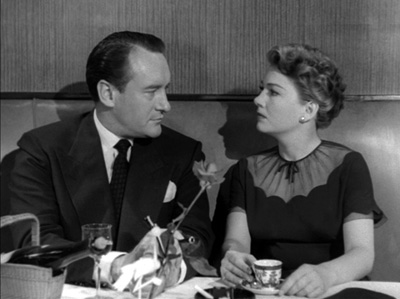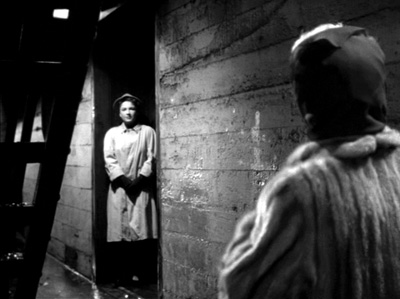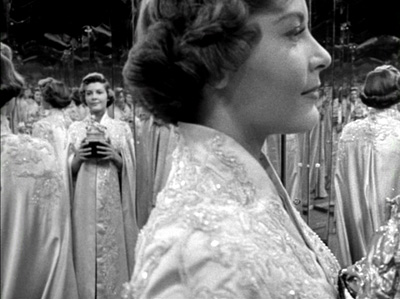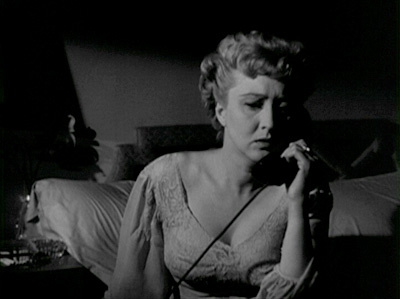
 There’s no doubt that All About Eve is one of Hollywood’s most iconic films. And while I can attest that it has top-notch performances by all the cast members involved (even Marilyn Monroe, who I can tolerate on a good day) and a knockout script filled with line after line of bitchy, witty comebacks, although I have to admit that when I need a Bette Davis fix, I prefer Hush, Hush, Sweet Charlotte which is one of my all time favorite movies.
There’s no doubt that All About Eve is one of Hollywood’s most iconic films. And while I can attest that it has top-notch performances by all the cast members involved (even Marilyn Monroe, who I can tolerate on a good day) and a knockout script filled with line after line of bitchy, witty comebacks, although I have to admit that when I need a Bette Davis fix, I prefer Hush, Hush, Sweet Charlotte which is one of my all time favorite movies.
Still, I can’t deny that All About Eve is a damn good movie and still remains extremely watchable after all these years (it’s showing tonight, on TCM at 8 pm EST.) It has that certain sophisticated *glow* that all 20th Century Fox movies have (at least from the Golden Era of Hollywood), which only adds to it’s mystique. But All About Eve wouldn’t be the classic it is today if it weren’t for the performances of Bette Davis, Anne Baxter and the always underrated Celeste Holm. It sounds cliched, but these actresses breathe life into the characters–you’re never bored by them, and they make the script work. Claudette Colbert was supposed to have played Margo Channing, but threw out her back while filming Three Came Home. A tragedy for Ms. Colbert, but can you imagine how radically different Margo Channing would have been? Bette Davis has that supreme ego (I mean this as compliment) that makes her Margo Channing the diva she was meant to be. I don’t think Claudette could have pulled it off.
I first watched All About Eve about three years ago. As a classic film newbie, I knew it was one of the movies that I had to see, and after I watched it, I felt a bit let down. Perhaps I wasn’t mature enough to appreciate it. I’m really showing my age here, but I think I expected a good old fashioned chick fight that included lots of bitch slapping and name calling. Having been in one myself (a long, long time ago), let me tell you–they’re much more fun to watch than to be in. It’s the hair-pulling that hurts the most, although the name calling is a close second.
 Anyway, when TCM premiered All About Eve during last month’s Oscar lineup, I decided to give it another go. After all, I’m older, wiser and can appreciate the subtlety of a well-timed quip now. Watching it through new eyes, I was surprised by certain “clues” to Eve’s character that director and writer, Joseph L. Mankiewicz sprinkled throughout. Eve (Anne Baxter) seemed a bit…manly, with her poise being the most telling clue. She didn’t move around the screen like the other women–no, there was something rough about her walk. She lacked femininity. But perhaps the most telling trait is in the way she and her female friend ascend the staircase after placing a phony sick call to Lloyd Richards (Hugh Marlowe). I’m always wary of people who “look” for homosexuality in films, since I think some of it is just pure speculation and projection, so I did a little research afterwards.
Anyway, when TCM premiered All About Eve during last month’s Oscar lineup, I decided to give it another go. After all, I’m older, wiser and can appreciate the subtlety of a well-timed quip now. Watching it through new eyes, I was surprised by certain “clues” to Eve’s character that director and writer, Joseph L. Mankiewicz sprinkled throughout. Eve (Anne Baxter) seemed a bit…manly, with her poise being the most telling clue. She didn’t move around the screen like the other women–no, there was something rough about her walk. She lacked femininity. But perhaps the most telling trait is in the way she and her female friend ascend the staircase after placing a phony sick call to Lloyd Richards (Hugh Marlowe). I’m always wary of people who “look” for homosexuality in films, since I think some of it is just pure speculation and projection, so I did a little research afterwards.
 My suspicions were confirmed: according to Mankiewicz biographer, Ken Geist, the character of Eve Harrington was originally conceived as a lesbian. When you know this little bit about Eve, the film suddenly takes on a whole new light–especially where her relationship with Addison DeWitt is concerned (an Oscar winning perfromance by the marvelous George Sanders). There are lines in the “reveal” scene that throw the viewer for a loop, particuarly in the statement where Addison proclaims, “You realize and you agree how completely you belong to me.” Perhaps Mankiewicz wrote this line so it appears that Eve and Addison are having a sexual relationship–but I find it hard to believe, since neither has ever been affectionate towards one another. Yes, Eve has passion running through her veins, but Addison doesn’t. He gets more excitement out of making sarcastic comments and watching everyone in the theater world stab each other in the back. For all that’s been written about his character, I’ve never gotten the impression that Addison was gay. If anything, I felt that he was somewhat asexual. For him, sex just came with the job, like overtime and health benefits. I’ve always thought that Marilyn Monroe’s character had a relationship with him, and if the code allowed it at the time, I’m sure he would have attempted to play Svengali to a man as well. Yet, I feel the proper description for both Addison and Eve is “chameleon”–they both adapt to the people surrounding them, calculate the situation at hand and sense who they can best use to their advantage. Except that Eve lacks the finesse and wisdom that Addison has. She thinks in the moment, while Addison considers the whole picture and this leads to Eve getting beautifully played at the end.
My suspicions were confirmed: according to Mankiewicz biographer, Ken Geist, the character of Eve Harrington was originally conceived as a lesbian. When you know this little bit about Eve, the film suddenly takes on a whole new light–especially where her relationship with Addison DeWitt is concerned (an Oscar winning perfromance by the marvelous George Sanders). There are lines in the “reveal” scene that throw the viewer for a loop, particuarly in the statement where Addison proclaims, “You realize and you agree how completely you belong to me.” Perhaps Mankiewicz wrote this line so it appears that Eve and Addison are having a sexual relationship–but I find it hard to believe, since neither has ever been affectionate towards one another. Yes, Eve has passion running through her veins, but Addison doesn’t. He gets more excitement out of making sarcastic comments and watching everyone in the theater world stab each other in the back. For all that’s been written about his character, I’ve never gotten the impression that Addison was gay. If anything, I felt that he was somewhat asexual. For him, sex just came with the job, like overtime and health benefits. I’ve always thought that Marilyn Monroe’s character had a relationship with him, and if the code allowed it at the time, I’m sure he would have attempted to play Svengali to a man as well. Yet, I feel the proper description for both Addison and Eve is “chameleon”–they both adapt to the people surrounding them, calculate the situation at hand and sense who they can best use to their advantage. Except that Eve lacks the finesse and wisdom that Addison has. She thinks in the moment, while Addison considers the whole picture and this leads to Eve getting beautifully played at the end.

Another interesting characterization of Eve is her appearance. When we first see her, she’s emerging from the shadows dressed in a man’s trenchcoat and hat, giving off the impression that they once belonged to her deceased husband. Eve wants to come off as a girl who’s just making do with what’s at hand. But when you find out the truth–there was no husband!–you realize that Eve is a master at costuming herself for the situation at hand. That innocent-looking trenchcoat and hat make her look drab enough to gain sympathy from Karen Richards (Celeste Holm), who first spots her in that darkened alley (now film scholars note that homosexual characters in classic Hollywood films are “coded” this way–lurking in the shadows). Upon first inspection, Eve seems like a shy, sweet theatergoer who has nothing but admiration for Margo Channing. Since it’s all an act, you have to imagine the amount of planning and preparation Eve had to do in order to make her sob story work. In order to seem legit, you need to look the part as well as make it believable.
Later, when Eve attempts to seduce Bill Simpson (Gary Merrill), she’s again in costume after taking over for Margo. It’s as though Eve cannot play herself–everything she does is a performance for the secret play going on in her mind. Unlike Karen, Bill doesn’t buy it–he flat out rejects Eve. Having seen and worked with all types of actors and actresses, Bill is much more cynical and hardened to the world around him. It’s an interesting comparison to Karen, who spends her free time painting and only observing the theater world from a wife’s viewpoint. She’s not actively involved and while it makes her a bit more naive, it also makes her susceptible to Eve’s plans.
Many people would say that the final scene between Eve and the mysterious Phoebe is the crowning moment of All About Eve. The main point is to let the audience know that in future years to come, Eve will be replaced by Phoebe and other aspiring, cutthroat actresses just like her. But those last five minutes or so tell more about Eve’s true personality than the entire film did. Not only is it the first time we see Eve smoking, but while talking with Phoebe, she drapes herself languorously on the couch. Clearly, Mankiewicz wanted the lesbian side of Eve to be finally revealed and when it is, it’s a bit off-putting. While she’s cold to others, she’s almost leering in her invitation to Phoebe. It’s obvious that she’s attempting to seduce the young woman by asking her to stay the night–yet, it’s Eve who’s being taken in for a sucker. Phoebe is pulling the same routine that she pulled on Margo. The two women even share physical similarities: the same husky tone of voice, a no-nonsense haircut and plain jane clothes. Phoebe is a chameleon as well. The only difference is that she reveals her cards to Addison when he drops off Eve’s forgotten award (and in the process, admits that “Phoebe” isn’t even her real name!). Her ambition is clear-cut. For all you know, Phoebe may be lying about her involvement in the “Eve Harrington Club”–after all, Eve lied about her non-existant husband and who says Phoebe can’t do the same?

While some critics claim that Mankiewicz’s portrayal of Eve is supposed to be an attack on lesbians, I only believe that to be a half-truth. Eve is just a terrible person. She may prefer the company of women in her private life, but it’s clear that in her public one, she’d sleep with anyone to get ahead. If anything, I think Mankiewicz succeed in showing us that the life of an ambitious actress is a lonely one. Even in the closing shot, where Phoebe stands among reflections of herself, I take that as a comment on being alone. Eve has no true friends. Addison considers her his “property”, a puppet he can use when he needs her. Margo and Karen have each other and Phoebe is just using Eve to get ahead in the world. Eve winds up with no one. Her ruthless ambition has cost her any close friendships. She will spend night after night alone, with only herself as company. On a related note, Is there any wonder why Bette Davis titled her first autobiography, “The Lonely Life”? Success certainly comes at a cost.
 In the scene where Margo rejects the role in Lloyd’s play, she bases her decision on her upcoming nuptials to Bill, saying, “It means I finally got a life to live. I don’t have to play parts I’m too old for just because I have nothing to do with my nights.” Margo has realized that true love is more important that the adoration of nameless, faceless theatergoers. Bill’s love is the only applause she wants now. She has put her own ambition aside to become a wife. In a case of fiction mimicking real life, Bette Davis and Gary Merrill eloped during the filming of All About Eve, where after, Davis put her career shortly on hold to become a housewife. The marriage, filled with bouts of drunken arguring, didn’t last and both parties would later say that Margo and Bill, not Bette and Gary, fell in love.
In the scene where Margo rejects the role in Lloyd’s play, she bases her decision on her upcoming nuptials to Bill, saying, “It means I finally got a life to live. I don’t have to play parts I’m too old for just because I have nothing to do with my nights.” Margo has realized that true love is more important that the adoration of nameless, faceless theatergoers. Bill’s love is the only applause she wants now. She has put her own ambition aside to become a wife. In a case of fiction mimicking real life, Bette Davis and Gary Merrill eloped during the filming of All About Eve, where after, Davis put her career shortly on hold to become a housewife. The marriage, filled with bouts of drunken arguring, didn’t last and both parties would later say that Margo and Bill, not Bette and Gary, fell in love.
Of all the performances in All About Eve, my favorite comes courtesy of Celeste Holm. As Karen, the wife to the famous playwright, Lloyd Richards, she lives a very good life rubbing elbows with the theater elite. It’s a happy marriage. But when Eve gets hold of a cruel joke that Karen played on Margo, her happiness finally becomes threatened. Karen finally feels the sting of loneliness, albeit in a different fashion from Margo. Since Eve is now the new leading lady of Lloyd’s new play, the reheasals only bring them closer together, therefore pushing Karen out of the picture. Right before that fateful phone call, we see Karen lying in bed, musing about their relationship: “Everything Lloyd loved about me, he’d gotten used to, long ago.”

As an observer to the ups and downs of the theater, Karen knows how easily aging actresses are replaced. What makes an aging wife any different? It’s a scary thought, especially after witnessing exactly how manipulative Eve truly is. When Eve finally thinks she has Lloyd in her clutches, she tells Addison about her plan to steal him away from Karen, throwing in a few lies for good measure. This is what finally causes Addison to snap. Knowing that Karen is a good woman and also because Lloyd is a successful playwright whose plays can make or break actresses, Addison blows the roof off Eve’s plans, setting her straight. Attempting to upstage an aging, past-her-prime actress is one thing. To destroy a marriage is another. One wonders what he would have done if Bill gave into Eve’s temptations backstage.
Mankiewicz’s portrayal of the men in this film is especially positive–both Bill and Lloyd stay true to their ladies, and when you include Addison in that group, none of them are easily swayed by Eve’s poisonous charms. Lloyd only wants to do the best for his writing, Bill is madly in love with Margo and Addison is in love with his career. Since all three hold positions of power, they’ve seen every dirty trick in the book. Combine that with the male ego, and you’ll understand why they refuse to be undermined by a up-and-coming actress. It was easier for Eve to worm her way into Margo and Karen’s circle–she could pretend to identify with them, comfort them and offer compliments when needed. Men and woman are equally insecure, it’s just that women tend to wear their emotions on their sleeve. And for someone like Eve, this is all the bait she needs.
At face value, All About Eve is a great movie, but when you dig a little deeper, you find that there’s so much more to it than just backstabbing, betrayal and Margo’s famous line, “Fasten your seatbelts. It’s going to be a bumpy night!”. It’s about actresses and their vulnerabilities, a married woman facing her worst nightmare and how cruel and low some people can stoop to in order to get ahead in the world. It’s also about love, for it’s love that saves Margo Channing from herself and love that saves the marriage between Lloyd and Karen Richards. Without love, you wind up like Eve Harrington. Successful and adored, but lonely and used. And who wants to live a life like that?
This week’s MP3 doesn’t have to do with All About Eve, per se, but “Backstabbers” by The O’Jays could be the theme song to Eve’s devious plans. I love 70’s R&B/Funk and while it’s not classic movie related, I couldn’t pass up the opportunity to post such an appropriate song.
Download: “Backstabbers” by the O’Jays 2.8 MB – Link will open in new window and download it from there.







